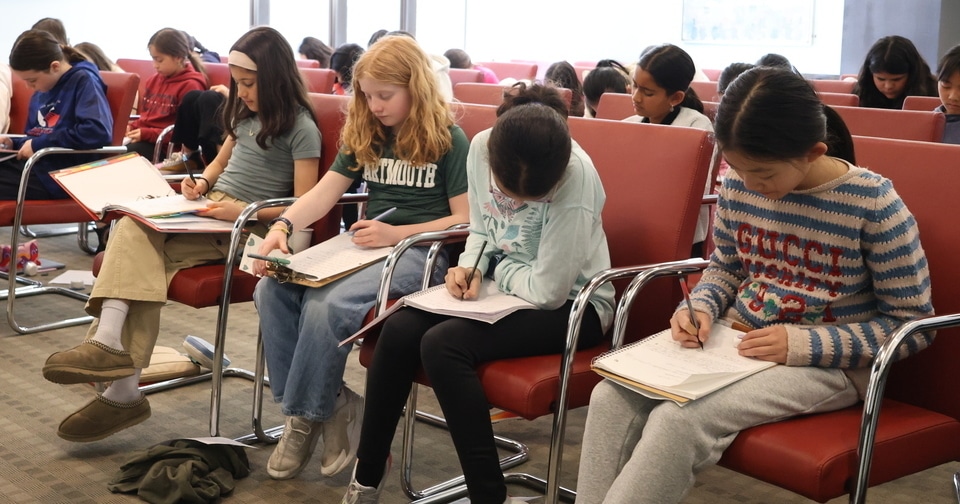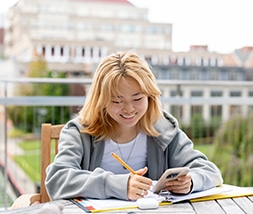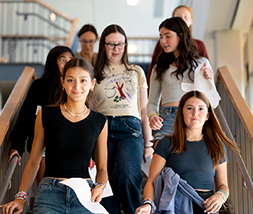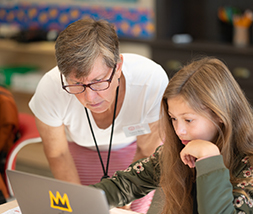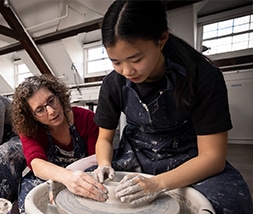Middle Grade Author Carrie Firestone Inspires Students to Take Action
Beloved English Faculty Laura Beebe and Lisa Stringfellow—who recently published her second book, Kingdom of Dust (Quill Tree Books, August 2024)—invited fellow middle-grade author Carrie Firestone to Winsor to work directly with students. The author of four books, Firestone gave a special lecture to Lower School students in the Epker-Sinha Wildcat Room focusing on how she turns her many lived experiences into books. Later in the day, she led a workshop with Class I on creative writing and another with Class II on personally-inspired activism; Class III and Class IV were also invited to join the author during Lower School lunch.
During the Lower School lecture, Firestone used a slide deck that featured personal photos, including piles and piles of childhood diaries where she processed feelings like anger and invisibility. “I’ve always been a writer,” she told students. Pulling from her own diary entries, Firestone offered dramatic readings from her own middle-grade and early-teen years, sharing details about secret crushes and social dynamics as a way to connect with Winsor students and let them know they’re not alone. “Friend drama took up so much of life in middle school, I didn’t have time to worry about world anxiety,” she joked about her diary entries. Today, at the age of 54, she shared that she is still in touch with those same middle school friends via daily text messages.
Activism, which she describes as “taking action to address an issue you care about,” is a common theme in Firestone’s life and is also infused into her writing. As a middle school student, Firestone turned a class project into an environmental campaign poster to raise awareness about protecting harp seal pups, known for their white fur. Later, as a high school student, she spoke to government officials on behalf of families of Vietnam veterans.
This tradition of and interest in community action continued for Firestone. As a teacher in New York City, Firestone created her school’s first environmental club where students picked up neighborhood trash and led the charge on a new fangled system: recycling. “We became a family,” she said of the environmental club. “That’s where I learned clubs are activism. Building community is activism.”
The First Rule of Climate Club (Putnam, July 2022) was inspired by Firestone’s work with the student environmental club and echoes other stories from her life—a diary with a key, friend drama, crushes, and even a friend running for office (Firestone supported a friend as campaign manager during their successful bid for state representative of Connecticut). Firestone encouraged students to see small acts of activism everywhere—a message that is reinforced by Winsor student experiences from Community Curriculum Day in the fall (as Lower School community and inclusion coordinator, Ms. Stringfellow was one of the faculty organizers) to clubs like Ms. Beebe’s Planet Protectors (the masterminds behind Winsor’s solar panels).
In her 40s, Firestone learned that pollution from a local gun factory was affecting her hometown and became involved in the public outcry for change. In retaliation, Ms. Firestone became the subject of a smear campaign and had to endure social media bullying for photos she posted online. “If any of you have ever been taken down because someone was criticizing the way you look, I want you to start questioning that. You’re beautiful, so it’s not because of that. They want to take away your power,” she told students.
Experiences like these inform Firestone’s writing. Talking about Dress Coded (Putnam, July 2020) she said, “every story in that book comes from real life,” whether anecdotes from her own children, her own lived experiences (like social media bullying), or people she interviewed. Other themes from Firestone’s life made it into the book, too—world anxiety, making posters to spread awareness, public speaking, honoring people lost in war, and fighting unfair dress codes—which all form the backdrop for the underlying theme of community connections. “Writing books is activism,” she added, detailing the support she’s been able to offer students who want to get their own school dress codes changed after reading her book.
At the conclusion of the lecture, Firestone invited students to draw on their own lived experiences and try their hand at character development. Students were asked to give their character a name and then layer on some details:
- What is your character’s deepest fear?
- What is your character’s favorite item of clothing or accessory?
- What is the character’s vibe, what is their energy?
- What does your character keep in a shoe box under the bed?
“We all have layers,” she told students, as she encouraged them to find their unique perspective. “Take all these things in your life, put them in a blender, and press the on button.”
